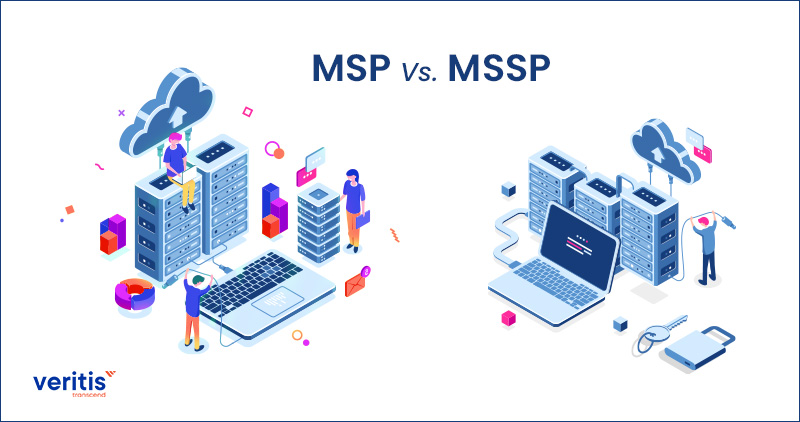
Better internet bandwidth at the dawn of the dot.com era made IT specialists able to troubleshoot software and apps from a distance. In the early 2000s, this aided in developing the managed IT services sector. IT professional services and consulting firms have begun assembling teams of IT specialists who work remotely to offer technical assistance to businesses.
You are concerned about your company’s safety and your client’s information, and you understand how crucial it is to cooperate with security operations providers you can rely on. However, understanding the differences in the MSP Vs. MSSP comparison can be challenging. As a busy professional, you may not have the time to understand the MSP Vs. MSSP and this blog sums up the MSP model, MSSP cybersecurity, and MSP Vs. MSSP.
MSP and an MSSP are why your business requires both services, even though you know your organization has a managed service provider. There are many things to consider while looking for the best solution to handle your company’s security. Choosing between the two services might be challenging, but we’re here to help you determine which is best for your company’s security requirements by explaining the distinctions between MSP Vs. MSSP.
Useful link: 10 Business Benefits of Managed IT Services
If you are currently working with an MSP, you may know your provider is switching to an MSSP cyber security model. While some businesses try to meet the security standards necessary to be a reliable MSSP, many need a thorough grasp of how to use the technology. This is similar to buying exercise equipment but only utilizing it sometimes. Even if you have the right tools for the work, nothing will change if you don’t use them appropriately.
There are differences between MSPs and MSSPs, and switching from one to the other requires more than buying new hardware or software. Let’s examine the primary distinction between MSP Vs. MSSP before going in-depth with the article on which is the better choice for the IT requirements of your business.
What is MSP?

It is tough to manage everything in this fast-paced world. With increasing expectations for shorter time-to-market, enterprises need help managing everything. This short attention span and infinite time crunches result in errors and shoddy work quality. These factors, among others, led to the growth of managed IT services providers, a new sector in the IT arena.
But what is MSP? A managed service provider, or MSP, oversees and maintains your company’s technological infrastructure. This supplier makes sure your business has everything it needs to operate efficiently. Why Managed Services? An MSP’s services will impact both internal and external stakeholders. For example, your IT-managed services provider examines your data and ensures that it is accessible and beneficial to employees and clients who require it. In addition, your MSP services would assist you in fixing any technical problems you encounter, such as difficulties accessing your data.
Your managed IT service providers are primarily concerned with managing technology. An IT Managed Service Provider is responsible for assigning rights to staff members according to their job descriptions, integrating new hires into your IT system, logging and reporting log data, and troubleshooting when a problem occurs. Managed IT services providers can collaborate closely with the database manager at your firm to give employees the guidance and assistance they require to do their jobs effectively.
An efficient MSP model would help reduce onboarding problems when a business launches a new application. Your MSP may intervene and resolve technical performance or usability concerns, freeing your IT team to focus on more crucial tasks.
Usefull Link: 9 Keys to Selecting a Right Cloud Managed Services Provider (MSP)
MSP’s services primary area of interest is its outsourced IT services. Typically, managed IT service providers handle:
- Providing personnel with technical help managing IT infrastructure
- Providing outsourcing for fully managed hardware
- Increasing the cybersecurity of IT systems
- Managing user accounts for access to systems owned by clients
- Keeping track of software inventory
- Managed IT Services Providers can offer remote servers, storage, and software.
Some MSPs additionally provide their IT know-how to help a client’s system stay trouble-free and aid customers with usage issues. Many people collaborate with IT infrastructure Services because they can provide a specialized service or completely replace an organization’s IT department. The knowledge of Managed IT Services Providers also grows as the technology sector develops.
What is a MSSP?

MSPs are a niche area that you would have heard of. However, MSSP is a relatively new sector that has arisen to support the new needs of the IT sector. But what is a MSSP? MSSP is a Managed Security Services Provider that delivers security solutions or security-as-a-service.
It is a company that provides other businesses with outsourced security services, software, and expertise. Organizations who wish to outsource their cybersecurity program may get top-tier cybersecurity expertise from MSSPs. Working with an MSSP cyber security firm is frequently either a replacement for or a supplement to having an internal security operations center (SOC).
Companies may outsource to Managed Security Services Providers if they cannot adequately staff their SOC with cyber experts. Businesses in highly regulated sectors like banking and healthcare also rely on the exceptional experience of the managed security services provider to guarantee that their networks are safe and compliant.
Proactive measures such as a managed firewall, a virtual private network (VPN) configuration and administration, anti-virus setup and management, event monitoring and alerting, intrusion detection/prevention capabilities, and incident response are frequently included in the MSSP cybersecurity services.
Why MSSP?
MSSPs’ cybersecurity model would assist their clients in spotting and responding to cybersecurity incidents. Cybercrime is one of the major concerns for organizations today.
Organizations must arm themselves with cutting-edge managed cloud services technologies and procedures to protect their data and regular operations against a breach or incursion. However, most internal IT teams are overburdened with routine IT work and service ticket handling, leaving little time and money to supervise cybersecurity. As a result, businesses rely on Managed Security Service Providers to plan, develop, and monitor their security infrastructure to provide complete cybersecurity.
From sophisticated security operations centers, Managed Security Service Providers (MSSPs) often offer round-the-clock cybersecurity services managed through security operations centers (SOC). Through the MSSPs cybersecurity model, one can gather and analyze data from the IT infrastructure of their clients to assist their clients in detecting, identifying, and mitigating attacks. They use sophisticated security monitoring systems like SIEM (security information and event management).
Companies may also supplement their internal IT teams by engaging qualified cyber security Managed Security Services Provider security professionals to address the skill gaps and protect their organizations from cyberattacks.
Useful Link: How Managed IT Services Help Industries ‘Scale-up’ Performance?
MSP Vs. MSSP

Although both MSPs and MSSPs offer third-party services to organizations, their objectives differ significantly. Managed Security Services Provider managed solutions are solely focused on offering cybersecurity services, whereas MSP-managed solutions offer network, application, database, and other essential IT maintenance and services. While IT Managed Services Provider offers planning and services for incident response, an MSP is more reactive; they are contacted when something occurs.
MSSPs provide certain security services, such as managed detection and response, intrusion detection and prevention, and incident planning and management, so many MSPs collaborate with them and enter into contracts with them.
An MSP employs a network operations center (NOC), which controls network-related events and alarms to minimize downtime and successfully offer network support. For their clients’ ongoing system, data security management, and monitoring, MSSPs often maintain a high-availability security operations center (SOC).
Useful link: Difference Between Managed Services Vs Professional Services
Case Study Highlight: Enhancing IT Infrastructure and Security for an Energy Sector Leader
Distinguishing between a Managed Service Provider (MSP) and a Managed Security Service Provider (MSSP) becomes easier when viewed through practical examples. A case in point is Veritis’ collaboration with a leading energy sector organization aiming to upgrade its IT infrastructure while maintaining strong security measures.
Client Challenge:
The client was grappling with a range of issues, including outdated infrastructure, fragmented system visibility, and growing security concerns. These challenges were particularly daunting in an industry that demands high reliability and strict regulatory compliance.
The Veritis Solution:
- As an MSP, Veritis assessed the organization’s IT landscape and implemented a comprehensive infrastructure modernization strategy. This included system integration, performance enhancements, and centralized monitoring.
- In parallel, elements typically provided by an MSSP, such as risk mitigation planning, security layer implementation, and compliance checks, were introduced to safeguard the evolving infrastructure.
Results Achieved:
- Improved Infrastructure Reliability: Unified and scalable systems enabled smoother operations.
- Stronger Security Posture: Integrated security protocols reduced vulnerabilities and improved threat response.
- Operational Continuity: Our proactive monitoring ensured minimal downtime and improved efficiency, giving our client the peace of mind that their operations were secure.
This engagement highlights the distinct yet interconnected roles of Managed Service Providers (MSPs) and Managed Security Service Providers (MSSPs). While Managed Service Providers (MSPs) focus on performance, availability, and IT management, Managed Security Service Providers (MSSPs) emphasize threat prevention, compliance, and real-time security monitoring. In complex industries like energy, leveraging both services is often key to achieving secure and resilient IT environments, a fact that our client now fully appreciates.
Read the full case study: IT Infrastructure Solutions for Energy Industry.
Conclusion
Security is paramount today, and one should rope in Stevie Award winner Veritis to avoid unwanted incidents. Our holistic approach delivers customized, cost-effective solutions based on your unique requirements. So, reach out to us and walk away with a solution that suits you best.
Schedule Call for More Information
Additional Resources: